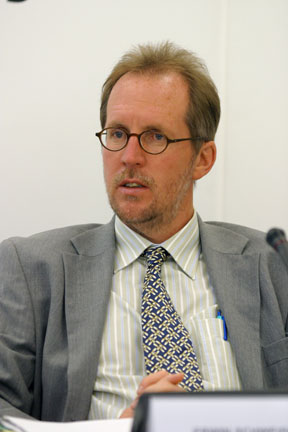Foreword
Conference “Autonomy for Papua – Opportunity or Illusion?”, 04-05. June 2003
With its more than 17,000 islands stretching over some 5,000 kilometres, the Republic of Indonesia comprises a multitude of socially and culturally diverse regions with different historical experiences. Preserving Indonesia as a unitary state is a difficult and permanent task in nation-building. With the fall of Suharto in 1998, chances arose that the concept of Indonesian national unity be understood not only as territorial integrity but as the unity of the people of Indonesia in a Republic based on democracy, the rule of law and respect for human rights.
As a step into this direction can be seen that in late 2001 the Indonesian Central Government and Parliament enacted a Law which granted the Province of Papua Special Autonomy. With the Law, it was hoped, the desire of the people of Papua for more self-determination could be satisfied while at the same time the principle of territorial integrity of Indonesia be upheld. One and a half years after the coming into effect of the Law, however, the implementation of this promising initiative has not gone far beyond the state of political intentions. Furthermore, recent administrative and political developments concerning the Province have raised doubts among observers, whether on the part of the Central Government a serious political will to implement Special Autonomy exists.
“Autonomy for Papua – Opportunity or Illusion?” was the title of a conference held in Berlin on June 4-5, 2003. The conference was jointly organised by the Friedrich Ebert Foundation, the Westpapua Network, Watch Indonesia! and supported by the German Commission Justitia et Pax, the United Evangelical Mission, the Human Rights Desk of the Diakonisches Werk, Misereor, missio Aachen and the Missionszentrale der Franziskaner. The more than 60 participants from Indonesia, Germany and other countries – comprising representatives from civil society organisations (NGOs, churches, political foundations etc.), academics as well as politicians and officials – discussed under which conditions the Law on Special Autonomy can offer possibilities for conflict resolution and the improvement of the socio-economic and the human rights situation in Papua. The organisers of the conference opted for a positive view: Properly implemented, Special Autonomy in Papua could reconcile the aims of the national authorities and the people of Papua and be beneficial for both sides. It might even be of significance to other parts of the country.
During the conference it became clear that international actors can only play a complimentary role in such a process. The main work has to be done by the principle actors, the Government of Indonesia and the people of Papua. However, if so wished by the two parties concerned, external actors can help to provide a platform for dialogue. This had been the main intention of the conference. At the end of two days of at times controversial discussions, it was generally felt among participants that the conference was a step on the path of dialogue which should be followed up. All sides welcomed the international community to play a role in supporting a constructive dialogue.
We hope that the conference has been a small contribution in making Papua a self-determined, equal and supportive partner within the Indonesian Republic.
Erwin Schweisshelm, Friedrich Ebert Foundation,
on behalf of the organisers of the conference








